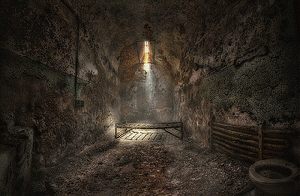Originally published on The Huffington Post on 4/30/13
Last July, Governor Tom Corbett (R-PA), in an attempt to reduce Pennsylvania's budget, signed Senate Bill 100 into law. As a result of this bill, instead of sending technical parole violators back to prison for technical parole violations, the offenders are instead redirected to community corrections centers which cost the state less money than it would to incarcerate an offender in a state prison. For those who have no firsthand knowledge of the criminal justice system, the bill looks good on paper and appears to be a great cost-cutting measure. However, many field-level criminal justice professionals knew this bill would be problematic because they know the offender population better than disconnected lawmakers.
Upon being released from prison, parolees have to adhere to a specific set of parole conditions. Parolees who have a history of drug addiction are mandated to attend drug and alcohol treatment. Many who are required to attend drug and alcohol treatment do so free of charge as many are indigent and on welfare; the taxpayer pays for the parolees' free drug treatment.
Sadly, many of the parolees are noncompliant with treatment obligations and resort back to drug addiction, which leads to increased levels of recidivism. In some cases, parolees remain free even after committing new crimes. So long as the crimes are nonviolent, Pennsylvania parole staff is unable to violate the parolees without first initiating a lengthy sanctioning process. In the meantime, the offenders are free to go about their business and continue to abuse drugs and alcohol, all while the supervising parole agent loses sleep wondering if the offender, in a drug-fueled rage, is going to victimize a citizen violently. Last August, an offender who was under Pennsylvania parole supervision submitted a urine sample that was positive for illegal drugs. The supervising agent requested a warrant for the offender's arrest, but the agent's request was denied by his chain of command. A week later, the offender killed a Philadelphia police officer. In the event that an offender does commit a violent crime that gets media exposure, the bureaucrats do what they do best: Absolve themselves and blame the supervising parole agent.
As a state parole agent, I once supervised a sexually violent predator I took very seriously. His classification for "predator" status was substantiated by the fact that he did not want to have sexual contact with anyone he knew or was his own age. He liked to hunt for younger girls, supply them with alcohol, and then force himself upon them in a sexual nature. I had caught him committing numerous technical violations of his parole. Based on his penchant for supplying underage girls with alcohol, this predator had mandatory parole conditions that he could not consume or possess alcohol or enter establishments that sell or serve alcohol. One day, he came to the parole office under the influence of alcohol and had been in a bar fight the previous evening. My only course of corrective action was to place him a community corrections center for 90 days, and then the predator was free to go. If hardcore criminals like this know that jail is no longer a consequence for parole violations, what deterrent do we have to stop them from violating?
I used to work as an operations manager at a community correctional facility in Philadelphia. I have been told by credible sources within community corrections that this bill makes the parole violator population within the centers almost untouchable. They don't follow the rules of the centers, they don't pay subsistence, they don't pay their fines and restitution, they don't complete their violence prevention courses, and less than 50 percent obtain employment. Many parole violators just loiter around the centers and have others smuggle in illegal and synthetic drugs.
I've been told that members of the parole violator population do not go back to prison for threatening to harm staff members of the centers physically. Instead, they are just transferred to another community correctional center. When I used to work at a center, the number of parole absconders was high due to their hatred of center life. Now my understanding is that parole violators no longer abscond because they can do whatever they want in the centers without being violated back to prison.
In Philadelphia, community corrections centers, for the most part, were traditionally populated with a different offender population: pre-release offenders. These offenders have been granted early release from prison due to good behavior. They are placed in community corrections centers while they await approval for parole. Sources within the centers have told me the pre-release population has been doing everything right. They adhere to the rules of the center, most either work full-time or go to school full-time, and they pay their fines, restitution, and subsistence. I've been told that many of the pre-release population behave so well in the centers that many have been granted furloughs to reside at their homes for multiple days of the week.
Recently, at a particular center in Philadelphia, the Department of Corrections re-incarcerated approximately 30 pre-release offenders, approximately 20 of whom either worked full-time or went to school full-time. The reason: the offenders did not have the word "parole" next to their names. Pre-release offenders who were playing by the rules were taken back to prison in order to make room for parole violators. I've been told by sources that the pre-release population work hard to earn parole and be productive members of society. All the while, the parole population takes their parole status for granted knowing they cannot be re-incarcerated due to Senate Bill 100.
The implementation of this bill was predicated upon saving the state of Pennsylvania money by reducing its prison population. Whether or not the motives behind the bill were good, there are obviously unintended consequences and negative residual effects. The bill might be effective in keeping parole violators out of prison, but it is creating a slippery slope. If parolees know they cannot be returned to prison for parole violations, what is the point of parole? What is the point of parole conditions? What incentives do parole violators have to live law-abiding lives?
This bill is not only doing an injustice to the Pennsylvania Parole Board, primarily the field agents, but it also appears to be doing an injustice to the offender population as well. It has created an atmosphere in which parole violators have free rein to thumb their nose perpetually at the entire parole system that has been crippled by this bill. On the other hand, you have a group of pre-release offenders who are bending over backwards to earn their parole status by following the rules. Their reward: re-incarceration.
If this bill is truly designed to save the state of Pennsylvania money, it is not worth it because more damage will be done in the long run. While one offender population is allowed to run amok, another group of offenders is being punished for doing the right thing, making them more bitter and angry at the system. This bill provides neither of these offender cohorts an incentive to be productive law-abiding citizens which only contributes to increased recidivism rates. When it comes to prison reform in Pennsylvania, it may be time for Pennsylvania's lawmakers to go back to the drawing board.






